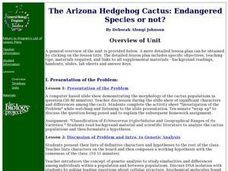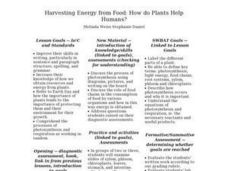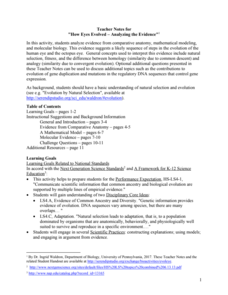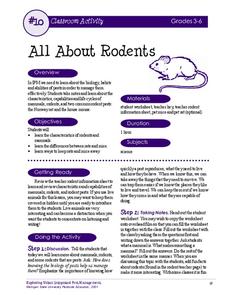Curated OER
Dinosaur! Fossil Rush: Tale of a Bone
Explore 1870s when a "bone rush" led to amazing discoveries, as fossil-hunters risked life and limb in their quest for dinosaur remains. The class uses the attached visual encyclopedia to prep for a discussion on early paleontology. Two...
Curated OER
The Arizona Hedgehog Cactus: Endangered Species or not?: Biology, Plants
In this lesson students will study the: "Classification of Echinocereus triglochidiatus and Geographical Ranges of its Varieties." Students read background material and scientific literature to analyze the cactus populations and then...
Curated OER
Animal Characteristics
Students investigate biology by completing a group classification activity. In this animal characteristics, students discuss the different families in the animal kingdom and the small differences that separate the animals. Students...
Curated OER
Introduction to Biology
Learners examine the study biology and explore the relationship between biology and daily life. In this nature of biology lesson students study articles and answer the given questions.
Koshland Science Museum
Infectious Disease: Evolving Challenges to Human Health Middle School Virtual Field Trip
Is there one right way to control infectious diseases? Learners determine the facts each stakeholder must consider when making their recommendations for controlling a disease threatening their area. They take into account public health,...
Curated OER
Harvesting Energy from Food: How do Plants Help Humans?
Beginning botanists view slides of plant vascular tissue. They watch Magic School Bus Gets Planted, which you can find online, and then write a summary of what they have learned about plants. This lesson could be used with upper...
Curated OER
Duck Detectives
Students explore biology by completing animal activity pages in class. In this bird characteristics lesson, students discuss the different types of birds that exist in North America and identify their migration habits. Students read...
Curated OER
The Effect of Natural Selection on Genes, Traits and Individuals
Rotating through five stations, evolutionary biologists explore the question of how changes in DNA facilitate the changes in a population over time. High-quality, colorful cards of animals, skeletons, skulls, and DNA sequences can all be...
Virginia Department of Education
Freshwater Food Chains
What's in the water? Encourage your class to further explore this question and learn about pond ecosystems, food chains, and food webs as they complete this hands-on activity. They view the environment from a new perspective after...
Curated OER
Chemosynthesis for the Classroom
Explorers set up Windogradsky columns with local mud so that they can culture microorganisms. After three and six weeks they make observations of the mud and the organisms growing in it. In this way they observe succession and relate...
Curated OER
Recombinant DNA to Protect Crops
Students read an article about manipulation of plant DNA. After reading the short article, they work in small groups to respond to the provided discussion questions and explain their answer to the class.
Serendip
Genetic Engineering Challenge – How Can Scientists Develop a Type of Rice That Could Prevent Vitamin A Deficiency?
Brown rice contains vitamins B and E, while white rice lasts longer in storage. The availability of rice around the world makes it a great candidate for genetic engineering. Scholars apply their knowledge of genetic engineering to solve...
Serendip
How Eyes Evolved – Analyzing the Evidence
Octopodes existed for hundreds of thousands of years before humans, yet our eyes share many similarities. Scholars analyze the evidence to determine if the evolution of eyes best fits a homology or analogy model. They discuss the issue...
Atkins
Attack of the Viruses!
Not all viruses are bad, but are all retroviruses groovy? The lesson starts with a detailed presentation before scholars create their own model of a virus. The resource incorporates many worksheets and practice questions to reinforce the...
Michigan State University
All About Rodents
Get to the know the common house mouse and the Norway rat with an activity that reinforces reading comprehension skills. Scholars read a three-page document detailing key information about mammals, specifically rodents, and use their...
Creative Learning Exchange
The Infection Game: The Shape of Change
Encourage the spread of knowledge in your class with this cross-curricular epidemic simulation. Pulling together science, social studies, and math, this lesson engages students in modeling the spread of infectious diseases, collecting...
Serendip
Food, Energy and Body Weight
High schoolers learn why humans need calories, how they control weight with food choices, and the impact of exercise on energy. Scholars then apply their understanding to a case study of lunch choices and exercise.
Channel Islands Film
Human Impact on the Food Web of Santa Cruz Island
What happens when a non-native species is introduced onto an island? Santa Cruz Island, part of the Channel Island chain located off the coast of southern California, provides the perfect laboratory for young environmental scientists to...
Constitutional Rights Foundation
Rachel Carson and the Modern Environmental Movement
Scholars analyze the environmental movement started in the 1960s. Through excerpts from Rachel Carson's books as well as diary entries, they take a look at the reason for the modern movement to save the planet and then create final...
Teach Engineering
Food Chains and Food Webs - Balance within Natural Systems
Feast on an informative resource. Scholars learn about food chains and food webs and how these interactions give information about the natural community. A PowerPoint presentation provides information about this concept.
University of Colorado
Punnett Squares with Piebald Deer
Explore the science behind Earth's amazing diversity of life with this lesson plan on genetics. Looking at specific traits in piebald deer, carnations, and roan cattle, young scientists use Punnett squares to determine the possible...
Concord Consortium
Gestation and Longevity
Is the gestation length of an animal a predictor of the average life expectancy of that animal? Learners analyze similar data for more than 50 different animals. They choose a data display and draw conclusions from their graphs.
DiscoverE
Heart Valve Replacement
Put your heart into it. Scholars design and build replacements for mitral heart valves. Obviously, they can't test their creations on a real heart, so a box with marbles (to represent blood cells) will suffice.
Global Oneness Project
Ancient and Modern Worlds
The old aphorism, "The road to Hell is paved with good intentions," might well serve as the title for a resource that asks viewers to consider the plight of the people of the Gamo Highlands, an area in southwestern Ethiopia. These...

























